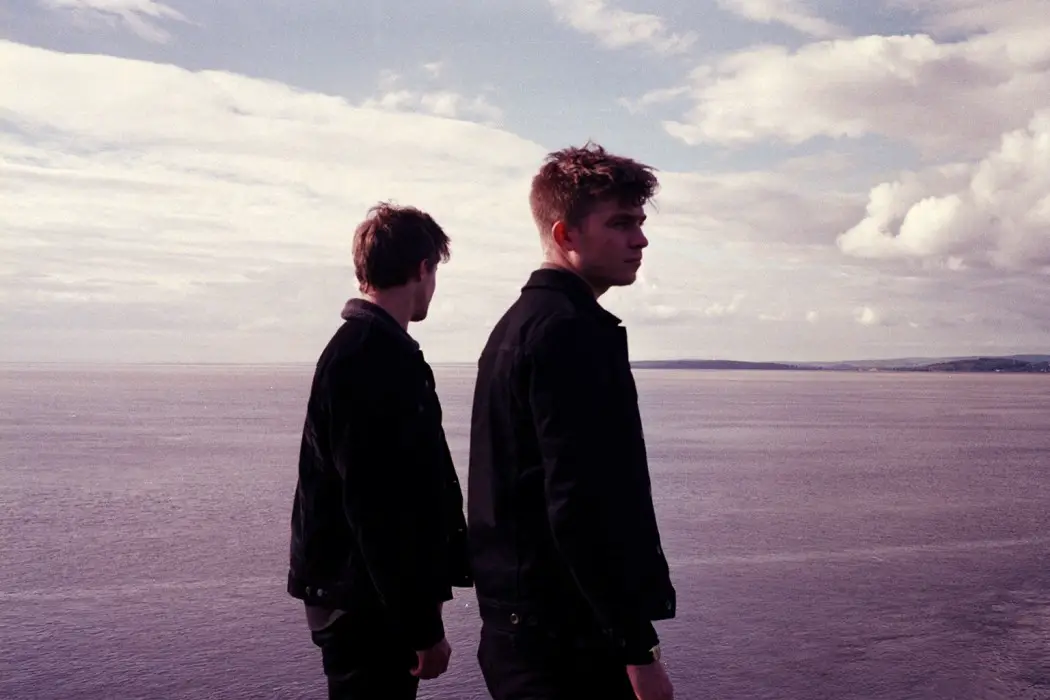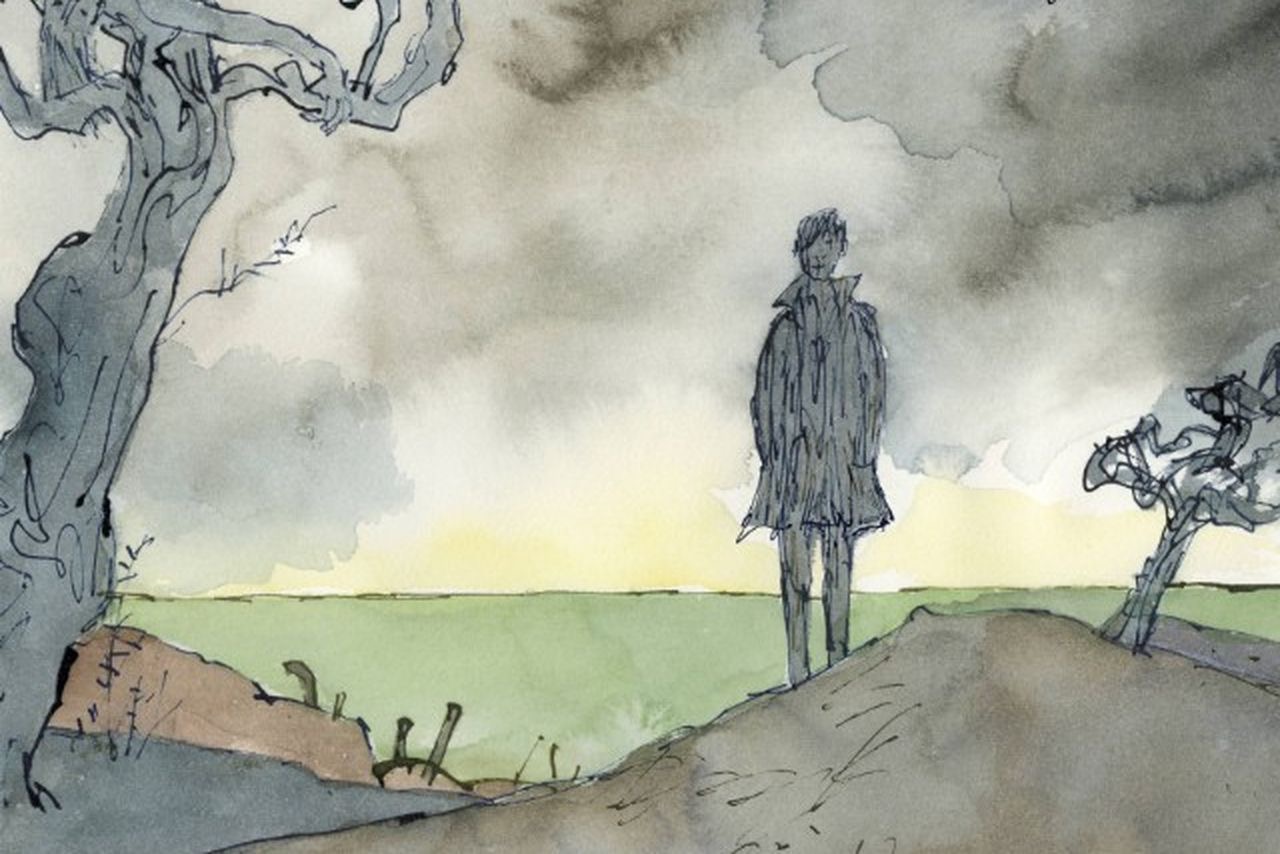Recommended If You Like: Sam Smith, Oh Wonder, The xx, Sir Sly
It’s harder to write a happy song than it is a sad song.
There’s something special about sad songs. They hit hard, evoking powerful emotions that resonate deep inside. We are more sensitive to negative feelings than we are to positive ones, meaning that emotions such as sadness or grief are stronger and last longer than those such as joy. Sad songs create a safe space where it’s okay to experience pain, hurt, and heartache, providing an outlet in which one can express oneself, connect to another, and indulge in the complexity and intensity of that emotional energy. The impact and widespread popularity of melancholy music dates back farther than Mozart; not only are sad songs cathartic, but they are also an integral part of the human experience.
And this glass, it breaks
It’s so delicate, it shatters round my feet
And my hands they bleed
A stain I’ll always remember
A stain that stays in me
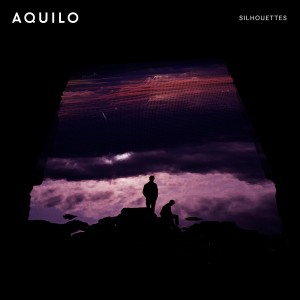
UK duo Aquilo are sad song experts, and their debut album Silhouettes is proof. Originally hailing from a small, rural village outside Lancashire, the atmospheric pop duo of Ben Fletcher and Tom Higham craft intimate, shiver-inducing songs whose haunting instrumentals and raw lyrics cut straight to the core.
Perhaps it’s the familiarity of heartbreak; maybe it’s some combination of human empathy and mortal fear. Aquilo expose our most vulnerable thoughts and feelings by laying themselves bare: Songs like “Human” implore us to be true to ourselves and unafraid of opening up, while the breathtaking “Silhouette” reflects on the idea of moving on from one’s past – be it an unsuccessful relationship, a lost loved one, or even a distant hometown. Tom Higham’s soaring vocals jump out of every track, bolstered by gorgeous minimalist arrangements and dreamy atmospheres that help to draw out a full, overwhelmingly honest emotional landscape.
A note you wrote upon the shelf
The frozen air in Silverdale
My heart was breaking by the shore
And I couldn’t give you anymore
And I’m still shaking and crawling back again
And all my brothers and all my sisters are gone
I’m sorry that I let you go,
I’m sorry that I cared
I’m sorry that the feeling shows
and I just wasn’t there
I’m reminded of the fool I was
I cut you off and fucked it up again
I’m sorry that I let you go,
I’m sorry that I cared
Aquilo wear their hearts on their sleeve in song. Nowhere is that better seen than in the brutally honest lyricism of ballads like “Sorry,” “Almost Over,” and “I Gave It All.” When Aquilo sing about sorrow, you know they’re sorry. When they sing about loss, you can feel their pain. When they sing about heartbreak, you know their hearts were broken. Aquilo capture the impact of coming-of-age and transition moments, where change leads us to reflect on the best and worst parts of ourselves. On “Blindside,” Higham comes to terms with the fact that he does not feel as strongly for another the way that person feels for him. We feel the weight of his heavy words as he struggles to find a way of expressing himself, without hurting the other person in the process.
Yet pain, like sorrow, is an inevitable, inescapable part of life – and it takes an artist like Aquilo to bring out the beauty in sadness. The band embraces a stirring range of emotions on Silhouettes, introducing themselves through what is unmistakably 2017’s most powerful debut to date. Atwood Magazine recently spoke to Aquilo’s Ben Fletcher and Tom Higham, catching them at a major milestone moment on the day of their album’s release. Get to know Aquilo through our exclusive interview, and immerse yourself and your emotions in Silhouettes, out now via Island Records/Harvest Records.
Silhouettes – Aquilo
A CONVERSATION WITH AQUILO
Atwood Magazine: Happy release day! How does it feel to finally have released your debut album?
Aquilo: Thanks – it’s amazing! It’s only just sort of dawned on us that we finally put an album out.
You’ve already released 5 EPs, some songs of which made it onto the full record. How does this experience differ from the EP releases, from a personal standpoint?
Ben Fletcher: I suppose people tend to judge you a little more on your album. We were always happy to put EPs out, because it didn’t feel like there was any pressure. You just put four songs that fit well, and that were made in a certain timeframe.
Tom Higham: Also, we were only discovering our sound as well with the EPs; I think that played an important part.
Ben: Yeah, the EPs were a sort of getting to grips with what we wanted the album to be like. We were testing the waters ourselves with the EPs, but for the album, I think it really took us so long because we wanted to be happy with it! There’s a little bit more pressure, but we definitely did the right thing in waiting to get it right.
You probably had no idea who ‘Aquilo’ really was three or four years ago, and what the music would become.
Aquilo: Three or four years ago, we didn’t really know how we wanted the album to be. It’s only been in the last two years that we’ve had this idea in our heads of how we wanted the first album to be.
What idea was that?
Aquilo: Sonically. It took us that time to work out how we wanted it to sound. I think once we’d met [producer] Ólafur Arnalds and we’d done a bit with SOHN, we started to get an idea of where it would go. We went over to Iceland for a while to work with Arnalds, and I think that was initially when we realized how we wanted the album to sound…
Bring yourselves back to the moment you submitted the final masters to production/distribution: When was that? Do you remember the final edits you made, and any uncertainties you had at the time?
Aquilo: It was just before we’d gone on tour with Lapsley to America. I don’t know, really! There were nerves there, but it was that feeling of it’s out of our hands now. We’d done what we felt was a good job! It was a strange feeling; I do remember us having a cutoff point, and being like, Oh god!
Have you gotten more or less nervous since then?
Aquilo: I think we started to realize that, if we’re happy with it, then there’s not really any reason to be nervous. Whether it does good or bad doesn’t really matter; whether ten people listen to it or ten thousand people listen to it, we’re pretty happy with this album! We showed it to our mates, we showed it to our family… and we’re happy!
Where does the name Aquilo come from?
Aquilo: It’s actually Greek mythology for the God of the Northern Wind.
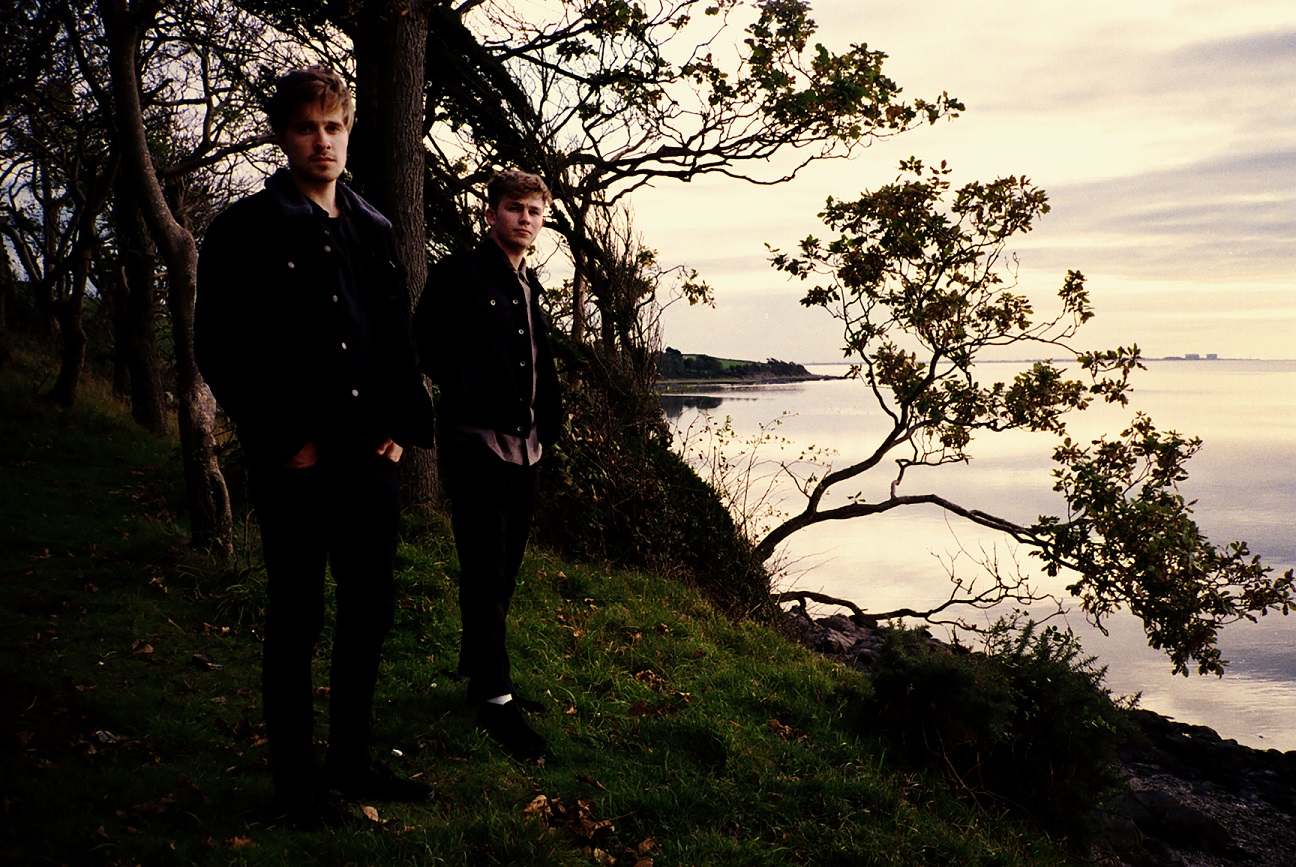
So I want to dive into your music, and to open it up I want to ask what, if any ideas keep you coming back to music time and again?
Tom: I guess it gets more like inspiration. We might listen to an album and then become completely obsessed by it, and sort of use that as motivation.
Ben: We never really write music when we’re in a really good mood. I think that’s something – it’s really hard to write a good, honest song.
Tom: I disagree with you, actually – I find it a lot easier to write a sad tune when I’m really happy. That sounds ridiculous, but –
Ben: Yeah, but I just think writing happy songs is really hard. We don’t really write happy songs, because… I don’t know. I’ve never really thought about that; never really thought about it.
In an interview with GQ Australia, you said your friends describe you as “two sad lads from up north.”
Aquilo: (laugh) yeah, ‘cause we only write sad songs!
You guys don’t sound sad to me, though! Do you think people would be surprised to meet you and discover your personalities?
Aquilo: Yeah… probably, actually. If you’d only ever heard our songs and then you met us, they probably wouldn’t match up.
Where does that sad songwriting come from?
Aquilo: It’s a weird one; bit of an anomaly, to be fair. I think it’s just easy for us to write. For us, it’s harder to write a happy song than it is a sad song, because we feel a lot more from them and they’re a lot more emotive. So, I think that’s why we sort of write depressing tunes – but we’re not that sad.
For us, it’s harder to write a happy song than it is a sad song.
How do you describe your music to you grandparents?
Ben: That is a really good question! I never really have described my music to my grandparents. I sort of played it to them, and my granddad sees it as “different,” but I just think that’s because he doesn’t know what else is out there! [laughs] You know what I mean? Umm… I’d probably just say “sad.” Sad music.
I’m always fascinated by starts and ends, so let me ask: Why “Silhouette” to open the record, and why close it with “Waiting”?
Aquilo: I think we loved to start an album with a song that means so much to us, and also to start it with that string section. We went over to Reykjavik to work with Ólafur Arnalds and produced that song with him, and it was this absolute moment for the both of us. I think starting it with that song means a lot to both of us; it just made sense starting with that one. To end it with “Waiting” again sort of made sense. It’s sort of an epic outro to the album. Sonically it works.
Is there any meaning behind the name of the album, Silhouettes?
Aquilo: I think it all ties back to the song “Silhouette.” That song was a real turning point for us and the album. When it came to choosing the name for the album, I think that was the key song for us – so it stems from the song.
Do you consider “Silhouette” the quintessential Aquilo experience?
Aquilo: Maybe…?
I’m not convinced.
Aquilo: I don’t know, I don’t think I’d describe it entirely as that. It’s close, but…
Does any song capture that?
Aquilo: I think “Waiting” isn’t too far off. We’re really happy with that one and “Almost Over.”
I love “Almost Over,” that’s one of my favorite songs on the record.
Ben: That’s the same for me, I reckon. Probably “Almost Over” and “Low Light” for me.
Why?
Ben: The songs just mean quite a bit, well to me, personally – with “Almost Over,” it holds quite a special place to me. They’re just important songs, and lyrics. When I listen to “Almost Over,” I still think back to when we both wrote the song. I sort of get that with “Waiting” as well.
Is there a story behind that, or just a feeling?
Ben: Yeah, there’s a story behind it, but I think the way that “Almost Over” has been written, you don’t really have to explain the story because the song is quite literal: It quite literally says the story as it is.
[youtube=https://youtu.be/BCzrfJ5WYxU?t=0s]
[youtube=https://youtu.be/gVDRPWHWVvs?t=0s]
[youtube=https://youtu.be/d2HGXyEdC10?t=0s]
In a recent interview with The Independent, you mentioned your interest in film scoring. This question comes from a fan in Italy: From the beginning, your videos showed a high cinematographic quality, and the clips and stories perfectly blend with your beautiful music. Can you speak to how you approach the process of making a video for your songs?
Aquilo: For music videos, we like something that tells a story; something that actually says something, or complements the music in a certain way. We’d met up with director Eoin Glaister and made this two-part music video for an EP that we did, “Losing You” and “I Gave It All.” When it came to doing the album, we actually had a far clearer idea that we actually wanted a three-part music video that was one story.
What was your relationship like with the directors and crew? To what extent were you involved?
Aquilo: We weren’t there for any of the shooting! We wanted to be, but we were on tour in America, so we couldn’t be there – which was… pretty frustrating. We gave a basic idea to Eoin, and I still reckon we give him the majority of the credit for that video. Even with the story as well, he knew what we wanted – we just wanted a very basic story that made sense with the music. We owe a lot to Eoin, because he’s fantastic in creating and he totally gets what we’re going for.
I love how three different videos essentially capture that same story through three different points of view!
Aquilo: There was always the worry that one of the videos might not be as strong as the others, but he’s just done such a good job at it!
I’m not even embarrassed to admit that I might have cried during the “Silhouettes” video.
Ben: Well yeah, when he’s dancing and he sees his dancing partner as his wife. Yeah, first time I watched it, that happened to me as well! I had a little cry.
What does that mean for your own creating to move you like that?
Ben: It’s just a hard-hitting moment.
Tom: It’s the pride as well. Something that you created and fits so well… It’s happiness as well!
I think the term hard-hitting fits your music well.
Aquilo: I mean, we don’t have intentions for it to be “hard-hitting.” I think if it’s done right, it ends up being hard-hitting. You never sit down and think, I want to write a hard-hitting song. Sometimes it just comes out a little more raw than others.
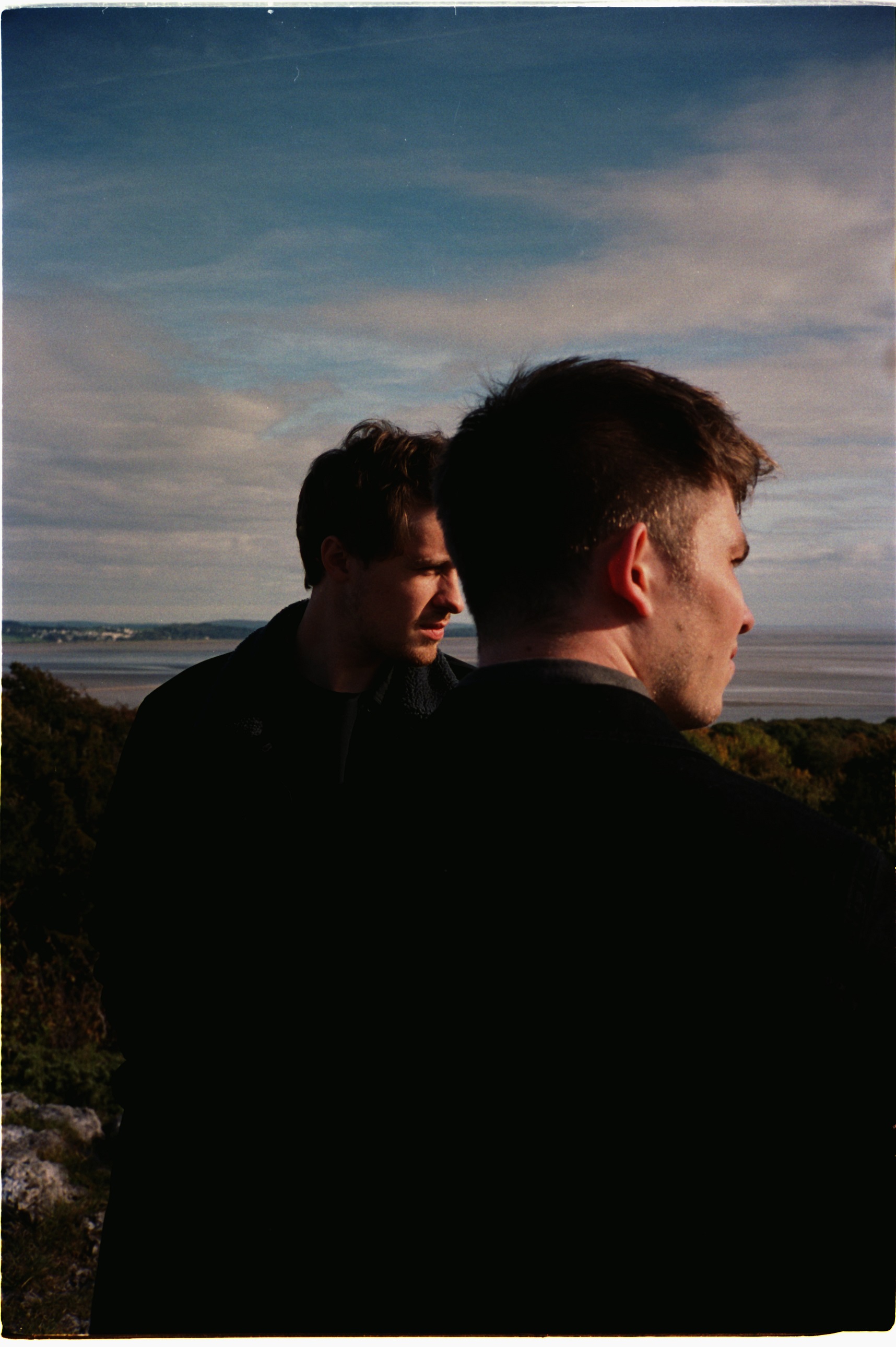
Your hometown of Silverdale has a population of 1500. Now that you live in London and tour internationally, do you still feel the influence of your hometown?
Aquilo: Yeah, it’s always something to compare to. We do compare a lot of things to being back home in Silverdale. It’s very different; there aren’t many places like Silverdale, with such a tight community where everyone knows each other. Sometimes London’s more of a lonely place than Silverdale; it can be quite hard to find friends. You see it in other cities and places around the world.
I feel it in New York City too.
Aquilo: It’s weird, like, people are inclined to keep to themselves in the city. Obviously that’s a generalization, but I find that more often than not, people do keep to themselves – whereas when you walk down the street in Silverdale and you pass someone, you say, “Hi!” In London, I remember when we first moved, and I sort of looked at someone, and they made eye contact and put their head straight down. It’s not even crazy – it’s just a different way of living, that’s all.
On your song “Human,” you implore another to keep their feet on the ground to be human again. How do you define the human experience?
Tom: That might be the deepest question I ever heard.
Ben: The song’s just quite literally about being human again, like you said, join your feet on the ground. That song has always been amazing, because we wrote that one with SOHN and he helped produce that one. We were huge fans of him at the time, and to write with him…
Tom: To come back to the question – that question is so good, that we can’t really give you an answer to match the question.
Ben: Yeah, I don’t know. The song is just about coming back down to earth and realizing that everyone has shit, and if you’ve got problems – I think it’s even in the lyrics: If you’ve got problems on the inside, you should show it on the outside. Just talk about things. It’s sort of a message to a friend, you know?
Do you guys talk things out a lot between the two of you?
Aquilo: Yeah, I suppose we do! Well, we live with each other, so we sort of have to! We’ve lived with each other for the past two years, so we know each other pretty well… almost too well!
How do you relate to UK contemporaries like The 1975 and HONNE, who occupy similar sonic spaces?
Aquilo: Love ‘em! Think they’re great. Brilliant. I think HONNE are class – absolutely class; we’ve met them once or twice. But we definitely don’t compare ourselves; we’re all so different. People do compare it, and I don’t quite see it… But our music couldn’t be any different! It’s very difficult for us to compare.
I definitely find that artists seldom compare their music.
Aquilo: It’s interesting you say that, because I’d imagine if you started getting wrapped up in what do we want to sound like, and do we sound like these guys, I think it’s a slippery slope in terms of the creative process. We just try to stick to our own thing basically, and we find that we write and make better music when we’re just doing our own thing. Like you said, it’s fun to make the links, but we don’t really think about that.
How did the live performance aspect impact your songwriting?
Aquilo: We absolutely love playing live so much, but I wouldn’t necessarily say it affects our songwriting. When we started out, we didn’t really think it was going to be a live thing; we were just experimenting with sounds, and we made a song called “Calling Me,” which was the first song we put out. We never thought it would go anywhere… So I guess writing songs, the thought definitely goes through your mind that you may eventually have to play it live, but I don’t think it shapes the song or plays any part in creating it.
Where would you say your biggest risks are on this record?
Aquilo: With the upbeat songs. We’re completely aware that a lot of our fans like the downtempo stuff and the really heartfelt stuff, but a risk that we took, I think, was putting “Never Hurt Again” on there, or “Complications.” They’re almost curveballs that I don’t think people who will buy the record will have thought would be on there. I don’t think that’s what people were expecting, but we felt the album needed it. It needed one or two songs to just lift.
Otherwise Silhouettes would be an album of depressing, brooding melancholy, right?
Aquilo: Absolutely. There’s only so much of that you can take, I think, before it starts to lose its moment.
Have you been finding more inspiration from other emotions since finishing Silhouettes?
Aquilo: I think it’s always evolving, really; it always has been since we’ve been making music. It’s always evolving, even with life, in a way – we’re going through different experiences, and those experiences definitely have an impact on our songwriting because we write about what’s happened with our lives.
What does 2017 hold for you guys?
Aquilo: Touring! We’re going to tour this album and see where it takes us, play it by ear. We want to play festival slots. Really though, we just want to tour; we don’t want to be home.
Stream / Purchase Aquilo’s Silhouettes!
— — — —

Connect with Aquilo on
Facebook, Twitter, Instagram
Discover more new music on Atwood’s Picks
cover: Aquilo © Morgan Hill Murphy

